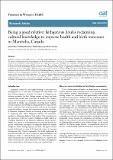| dc.contributor.author | Cidro, Jaime | |
| dc.contributor.author | Doenmez, Caroline | |
| dc.contributor.author | Phanlouvong, Ari | |
| dc.contributor.author | Fontaine, Ali | |
| dc.date.accessioned | 2021-04-19T17:29:14Z | |
| dc.date.available | 2021-04-19T17:29:14Z | |
| dc.date.issued | 2018-10-31 | |
| dc.identifier.citation | Cidro, Jaime, Caroline Doenmez, Ari Phanlouvong, and Ali Fontaine. “Being a good relative: Indigenous doulas reclaiming cultural knowledge to improve health and birth outcomes in Manitoba.” Frontiers in Women’s Health, 3(4) (2018): 1-8. DOI: 10.15761/FWH.1000157. | en_US |
| dc.identifier.issn | 2398-2799 | |
| dc.identifier.uri | https://hdl.handle.net/10680/1921 | |
| dc.description.abstract | Indigenous women are increasingly returning to culturally based birthing practices to assert their sovereignty over their bodies and their birthing experience generally. The impact of colonization on birthing experiences for First Nations women in Canada has been profound and extends into generations of families. First Nations women across Canada have traditionally birthed in their communities surrounded by families and community, observing many traditions around pregnancy and birthing including placenta burying and belly button ceremonies. These traditions and this circle of care and support resulted in resiliency, strength and a connection to the land and family. In Manitoba, Indigenous women are becoming trained and engaged in supporting their fellow Indigenous relatives and community members as Indigenous doulas or birth workers. This paper describes the experiences of the first cohort of Indigenous doulas trained in Winnipeg, Manitoba by the Manitoba Indigenous Doula Initiative (MIDI), also known as Wiijii’idiwag Ikwewag, and describes the specific contributions and impacts of Indigenous doulas who support Indigenous women during pregnancy and birth. Through qualitative interviews, our participants described various understandings of their work, purpose and their impacts on the women and families they support. Four recurring themes which emerged across the interviews included: prior negative birthing experiences, clashes with mainstream health and social services, the understanding of doulas as advocates, and empowerment and disempowerment. These themes all spoke to ongoing challenges Indigenous women continue to face during their pregnancies and births in mainstream healthcare systems, as well as highlighting the key forms of support that doulas can provide to ensure the self-determination and well-being of the women they work with. | en_US |
| dc.description.sponsorship | "This project was funded by the Canadian Institutes of Health Research through the Institute of Aboriginal People's Health (IAPH)." | en_US |
| dc.description.uri | https://www.oatext.com/being-a-good-relative-indigenous-doulas-reclaiming-cultural-knowledge-to-improve-health-and-birth-outcomes-in-manitoba.php | en_US |
| dc.language.iso | en | en_US |
| dc.publisher | Open Access Text (OAT) | en_US |
| dc.rights | info:eu-repo/semantics/openAccess | en_US |
| dc.subject | Doulas | en_US |
| dc.title | Being a good relative: Indigenous doulas reclaiming cultural knowledge to improve health and birth outcomes in Manitoba | en_US |
| dc.type | Article | en_US |
| dc.identifier.doi | https://doi.org/10.15761/FWH.1000157 | en_US |

